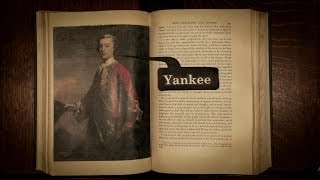(单词翻译:单击)
Mysteries of vernacular: Yankee,
通用俗语的谜团:洋基,
a New England resident or, more generally, a person who lives in or is from the United States.
是指一个新英格兰的居民,或更一般地说,一个生活在或者是来自美国的人。
Though the origin of Yankee is uncertain, this all-American word most likely descended from the Dutch moniker Janke,
虽然洋基的起源不确定,但这个很美国的词最有可能来源于荷兰语中的绰号詹克,
a diminutive meaning little Jan, or little John.
意思是小詹或小约翰的一个爱称。
In the 17th century, Janke was the common nickname of Dutch sailors, pirates in particular.
在17世纪,詹克是荷兰水手的常见昵称,特别是海盗。
A Dutch pirate ship operating in the West Indies was even called the Yankee.
在西印度经营的一艘荷兰海盗船甚至还被称为洋基。
Over the years, Yankee transformed from a pirate's nickname into a general term of contempt.
多年来,洋基从一个海盗的昵称转变为一种表示蔑视的一般用语。

In 1758, British general James Wolfe used Yankee as a pejorative term for the colonists under his supervision.
1758年,英国将军詹姆斯·沃尔夫把洋基用作一个贬义词,指在他管理下的殖民者。
But the insult wasn't limited to soldiers.
但这种侮辱并不限于士兵。
Yankee quickly came to mean New Englander, and by the 1780s, it was used to look down upon any American.
洋基很快指代新英格兰地区的人,并且从18世纪80年代开始,它被使用来歧视任何美国人。
During the Revolution, colonists co-opted Yankee and transformed it into a mark of national honor.
大革命期间,殖民者新增了洋基一词,并把它转变为一种国家荣誉的标志。
The Civil War, however, intensified the derisive definition when it was used by Southerners to mock members of the Union.
然而,美国内战增强了它嘲弄的意思,被南方人用作嘲笑联军的成员。
Today, it carries much less emotion, unless, of course, we're talking about baseball.
今天,它所蕴含的感情色彩少了,当然,除非是我们在谈论棒球。


